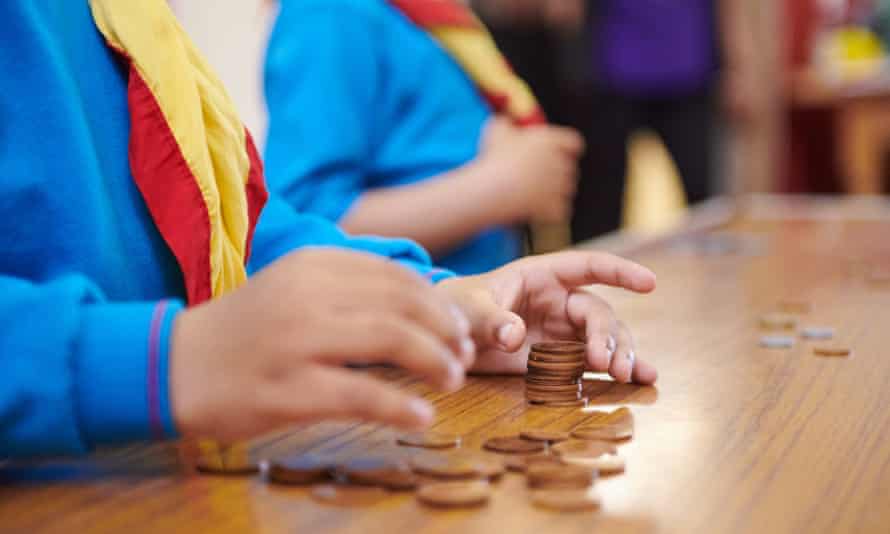On a Friday night in Enfield, north London, a group of eight-, nine- and 10-year-olds are discussing cryptocurrency and what people do with their cash. Fluttering in the evening breeze are Post-it notes bearing words including “electricity”, “toys”, “Netflix” and “bitcoin”, stuck on boards headed “spend”, “save” and “donate”.
The 20th Edmonton Cubs had been challenged to write down ways to use money, and after five minutes they have come up with lots – from the mundane to the unexpected. Although, as one points out, “most of them are about spending”.
They seem pretty sceptical about bitcoin and move quickly on to a conversation that covers giving to charity and writing a will. Their next task is to work out how they would go about buying a tent to take on a camp: the steps they would take, from seeing an advert to finding the item at the best price, via holding a fundraiser to cover the cost.
The group is trialling the first new badge for cubs and beavers for three years: the money skills activity badge, developed to teach six- to 10-year-olds about finance at a time when transactions are increasingly invisible.
Contactless, digital and mobile banking – plus more than a year of lockdowns and online shopping – mean some children have little or no experience of seeing money physically change hands.
The badge is designed to help them understand “in-app” purchases, and the way money works online and in shops, and to make decisions about their spending.
Amy Butterworth, programme design manager at the Scout Association, says: “When people think about the scouts, they often think about camping and hiking … but in order to get there, we need to have the budget to do it.”
She says these skills are particularly important following the pandemic, when “young people are going to be hit in a way we [can’t] yet predict”.
Activities that cubs and beavers can take part in include budgeting for a camp meal. As well learning how much items cost, and considering how to divide up their money, the members are also encouraged to think about the impact of their spending, and what happens if they buy Fairtrade or organic foods.
In another activity, beavers have to imagine they are packing their bag for a hike – while they might have lots of things they want to take, they have limited space and have to decide between them what they need and want, just like when there’s limited cash.

Louise Azavedo of 20th Edmonton has been setting the tasks for the cubs, who are aged between eight and 10-and-a-half, and beavers, who are younger, at six to eight years old.
The beavers have sorted plastic coins and tried to identify notes from around the world.
“They’re going to design their own coins and banknotes which they will present next week – it’s called the scout pound, and they’ll be able to use it to buy things as part of a game,” she says.
The badge, which is sponsored by HSBC, was developed with young people, parents and scout volunteers, and has been designed to be accessible even to children who are still grappling to grasp maths.
Stuart Haire, head of wealth and personal banking at HSBC UK, says: “The Covid-19 crisis has tested the financial resilience of many families as well as disrupted in-classroom learning, elevating the need for more flexible and effective financial education resources to help young people build financial capabilities for a changing world.
“Creating new and interesting ways for young people to engage with financial literacy is key, and we’re thrilled to be working with the scouts to launch their money skills activity badge – the first financial skill-building programme of its kind.”
The badge, which shows a world with a piggy-bank-style slot together with cash and a card, is one of many activity badges that beavers and cubs can earn by learning skills and completing tasks, either at meetings or at home.
Guides can earn a similar Saver badge.
